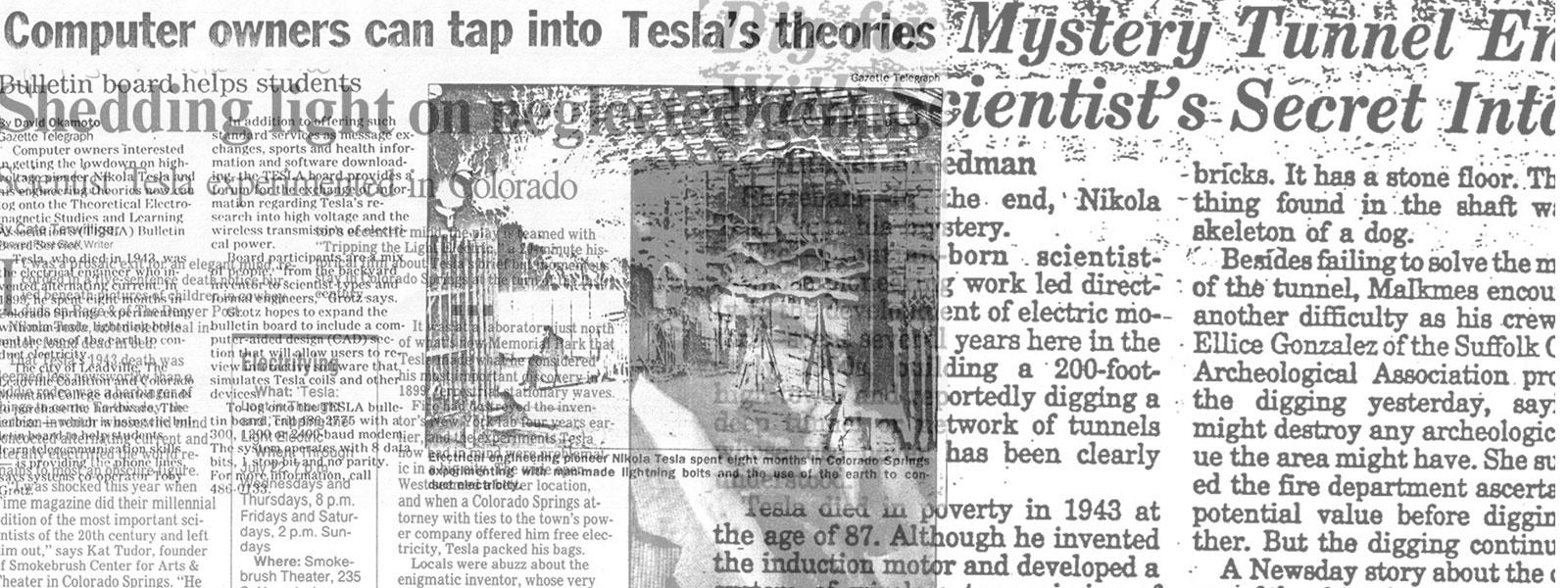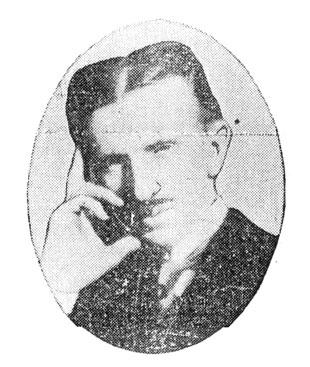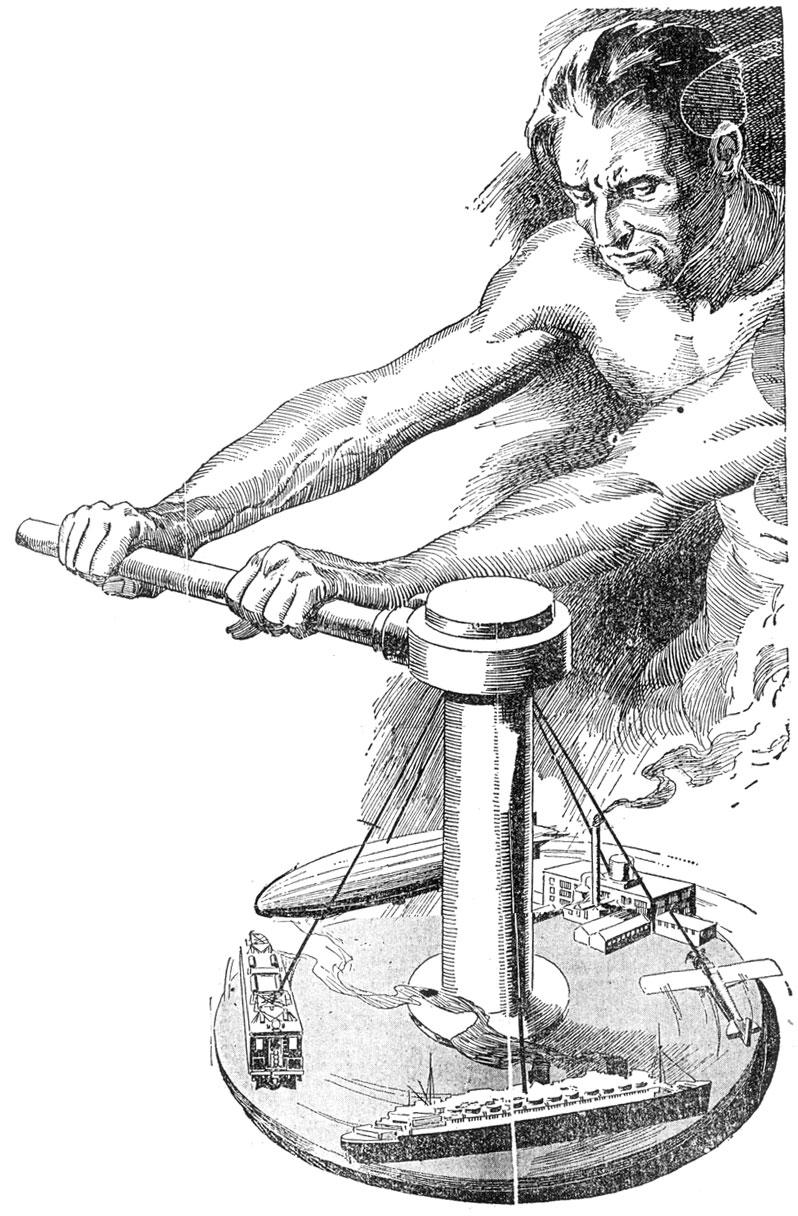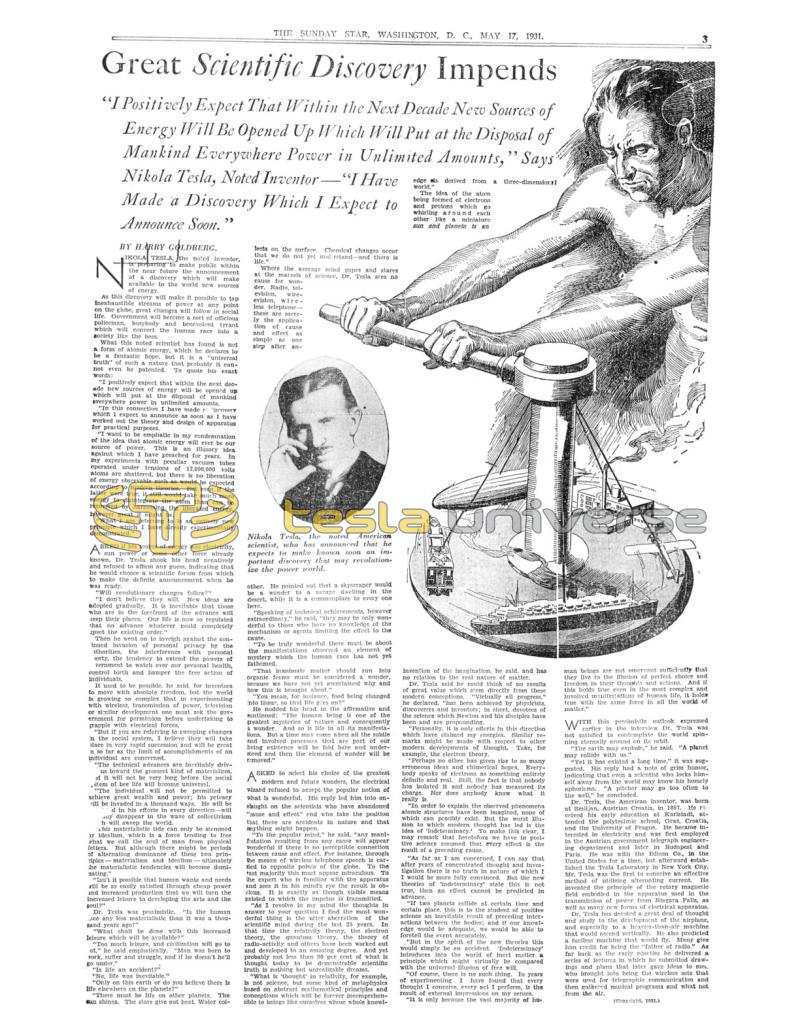
Nikola Tesla Articles
Great Scientific Discovery Impends
"I Positively Expect That Within the Next Decade New Sources of Energy Will Be Opened Up Which Will Put at the Disposal of Mankind Everywhere Power in Unlimited Amounts," Says Nikola Tesla, Noted Inventor — "I Have Made a Discovery Which I Expect to Announce Soon."
Nikola Tesla,the noted inventor, is preparing to make public within the near future the announcement of a discovery which will make available to the world new sources of energy.
As this discovery will make it possible to tap inexhaustible streams of power at any point on the globe, great changes will follow in social life. Government will become a sort of officious policeman, busybody and benevolent tyrant which will convert the human race Into a society like the bees.
What this noted scientist has found is not a form of atomic energy, which he declares to be a fantastic hope, but it is a "universal truth" of such a nature that probably it cannot even be patented. To quote his exact words:
"I positively expect that within the next decade new sources of energy will be opened up which will put at the disposal of mankind everywhere power in unlimited amounts.
"In this connection I have made a discovery which I expect to announce as soon as I have worked out the theory and design of apparatus for practical purposes.
"I want to be emphatic in my condemnation of the idea that atomic energy will ever be our source of power. This is an illusory idea against which I have preached for years. In my experiments with peculiar vacuum tubes operated under tensions of 12,000,000 volts atoms are shattered, but there is no liberation of energy observable such as would be expected according to modern theories. But even if the latter were true, it still would take much more energy to disintegrate the atom than can be recovered by harnessing the liberated energy, however great it might be.
"What I am referring to is an entirely new principle which I have already experimentally demonstrated."
Asked if his source of energy was electricity, sun power or some other force already known, Dr. Tesla shook his head negatively and refused to affirm any guess, indicating that he would choose a scientific forum from which to make the definite announcement when he was ready.
"Will revolutionary changes follow?"
"I don't believe they will. New ideas are adopted gradually. It is inevitable that those who are in the forefront of the advance will keep their places. Our life is now so regulated that no advance whatever could completely upset the existing order."
Then he went on to inveigh against the continued invasion of personal privacy by the authorities, the interference with personal property, the tendency to extend the powers of government to watch over our personal health, control birth and hamper the free action of individuals.
It used to be possible, he said, for inventors to move with absolute freedom, but the world is growing so complex that in experimenting with wireless, transmission of power, television or similar development one must ask the government for permission before undertaking to grapple with electrical forces.
"But if you are referring to sweeping changes in the social system, I believe they will take place in very rapid succession and will be great in so far as the limit of accomplishments of an individual are concerned.
"The technical advances are inevitably driving us toward the grossest kind of materialism. And it will not be very long before the social system of bee life will become universal.
"The individual will not be permitted to achieve great wealth and power; his privacy will be invaded in a thousand ways. He will be restricted in his efforts in every direction — will virtually disappear in the wave of collectivism which will sweep the world.
"This materialistic tide can only be stemmed by idealism, which is a force tending to free what we call the soul of man from physical fetters. But although there might be periods of alternating dominance of these two principles — materialism and idealism — ultimately the materialistic tendencies will become dominating."
"Isn't it possible that human wants and needs will be so easily satisfied through cheap power and increased production that we will turn the increased leisure to developing the arts and the soul?"
Dr. Tesla was pessimistic. "Is the human race any less materialistic than it was a thousand years ago?"
"What shall be done with this increased leisure which will be available?"
"Too much leisure, and civilization will go to pot," he said emphatically. "Man was born to work, suffer and struggle, and if he doesn't he'll go under."
"Is life an accident?"
"No, life was inevitable."
"Only on this earth or do you believe there is life elsewhere on the planets?"
"There must be life on other planets. The sun shines. The stars give out heat. Water collects on the surface. Chemical changes occur that we do not yet understand — and there is life."
Where the average mind gapes and stares at the marvels of science, Dr. Tesla sees no cause for wonder. Radio, television, wireless telephone — these are merely the application of cause and effect as simple as one step after another. He pointed out that a skyscraper would be a wonder to a savage dwelling in the desert, while it is a commonplace to every one here.
"Speaking of technical achievements, however extraordinary," he said, "they may be only wonderful to those who have no knowledge of the mechanism or agents limiting the effect to the cause.
"To be truly wonderful there must be about the manifestations observed an element of mystery which the human race has not yet fathomed.
"That inanimate matter should run into organic forms must be considered a wonder, because we have not yet ascertained why and how this is brought about."
"You mean, for instance, food being changed into tissue, so that life goes on?"
He nodded his head in the affirmative and continued: "The human being is one of the greatest mysteries of nature and consequently a wonder. And so is life in all its manifestations. But a time may come when all the subtle and involved processes that are part of our living existence will be laid bare and understood and then the element of wonder will be removed."
Asked to select his choice of the greatest modern and future wonders, the electrical wizard refused to accept the popular notion of what is wonderful. His reply led him into onslaught on the scientists who have abandoned "cause and effect" and who take the position that there are accidents in nature and that anything might happen.
"To the popular mind," he said, "any manifestation resulting from any cause will appear wonderful if there is no perceptible connection between cause and effect. For instance, through the means of wireless telephone speech is carried to opposite points of the globe. To the vast majority this must appear miraculous. To the expert who is familiar with the apparatus and sees it in his mind's eye the result is obvious. It is exactly as though visible means existed to which the impetus is transmitted.
"As I revolve in my mind the thoughts in answer to your question I find the most wonderful thing is the utter aberration of the scientific mind during the last 25 years. In that time the relativity theory, the electron theory, the quantum theory, the theory of radio-activity and others have been worked out and developed to an amazing degree. And yet probably not less than 90 per cent of what is thought today to be demonstrable scientific truth is nothing but unrealizable dreams.
"What is ‘thought' in relativity, for example, is not science, but some kind of metaphysics based on abstract mathematical principles and conceptions which will be forever incomprehensible to beings like ourselves whose whole knowledge is derived from a three-dimensional world."
The idea of the atom being formed of electrons and protons which go whirling round each other like a miniature sun and planets is an invention of the imagination, he said, and has no relation to the real nature of matter.
Dr. Tesla said he could think of no results of great value which stem directly from these modern conceptions. "Virtually all progress," he declared, "has been achieved by physicists, discoverers and inventors; in short, devotees of the science which Newton and his disciples have been and are propounding.
"Personally, it is only efforts in this direction which have claimed my energies. Similar remarks might be made with respect to other modern developments of thought. Take, for example, the electron theory.
"Perhaps no other has given rise to so many erroneous ideas and chimerical hopes. Everybody speaks of electrons as something entirely definite and real. Still, the fact is that nobody has isolated it and nobody has measured its charge. Nor does anybody know what it really is.
"In order to explain the observed phenomena atomic structures have been imagined, none of which can possibly exist. But the worst illusion to which modern thought has led is the idea of ‘indeterminacy.' To make this clear, I may remark that heretofore we have in positive science assumed that every effect is the result of a preceding cause.
"As far as I am concerned, I can say that after years of concentrated though and investigation there is no truth in nature of which I would be more fully convinced. But the new theories of ‘indeterminacy' state this is not true, then an effect cannot be predicted in advance.
"If two planets collide at certain time and certain place, this is to the student of positive science an inevitable result of preceding interactions between the bodies; and if our knowledge would be adequate, we would be able to foretell the event accurately.
"But in the spirit of the new theories this would simply be an accident. ‘Indeterminacy' introduces into the world of inert matter a principle which might virtually be compared with the universal illusion of free will.
"Of course, there is no such thing. In years of experimenting I have found that every thought I conceive, every act I perform, is the result of external impressions on my senses.
"It is only because the vast majority of human being are not observant sufficiently that they live in the illusion of perfect choice and freedom in their thoughts and actions. And if this holds true even in the most complex and involved manifestations of human life, it holds true with the same force in all the world of matter."
With this pessimistic outlook expressed earlier in the interview Dr. Tesla was not satisfied to contemplate the world spinning eternally around on its orbit.
"The earth may explode," he said. "A planet may collide with us."
"Yet it has existed a long time," it was suggested. His reply had a note of grim humor, indicating that even a scientist who locks himself away from the world may know his homely aphorisms. "A pitcher may go too often to the well," he concluded.
Dr. Tesla, the American inventor, was born at Smiljan, Austrian Croatia, in 1857. He received his early education at Karlstadt, attended the polytechnic school, Graz, Croatia, and the University of Prague. He became interested in electricity and was first employed in the Austrian government telegraph engineering department and later in Budapest and Paris. He was with the Edison Co., in the United States for a time, but afterward established the Tesla Laboratory in New York City. Mr. Tesla was the first to conceive an effective method of utilizing alternating current. He invented the principle of the rotary magnetic field embodied in the apparatus used in the transmission of power from Niagara Falls, as well as many new forms of electrical apparatus.
Dr. Tesla has devoted a great deal of thought and study to the development of the airplane, and especially to a heavier-than-air machine that would ascend vertically. He also predicted a fuelless machine that would fly. Many give him credit for being the "father of radio." As far back as the early nineties he delivered a series of lectures in which he submitted drawings and plans that later gave ideas to men who brought into being the wireless sets that were used for telegraphic communication and then gathered musical programs and what not from the air.


